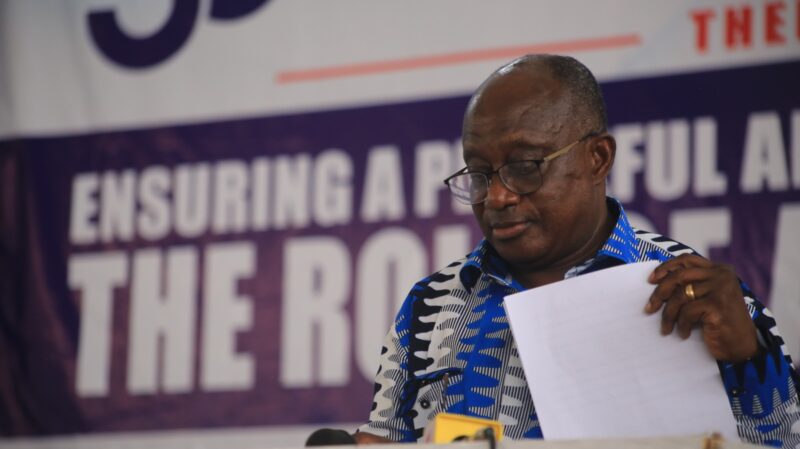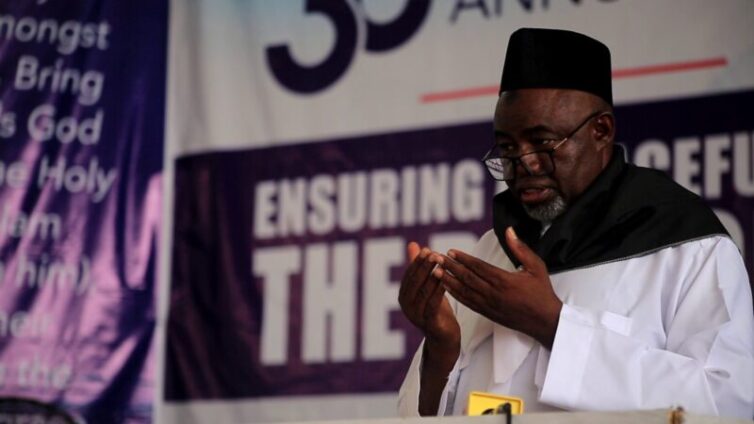The 1st Deputy Ameer of the Ahmadiyya Muslim Mission has said that justice is essential for ensuring credible and peaceful elections, stating the critical role fairness plays in the electoral process.
Alhaj Abdul Wahab Issah, referencing the Holy Quran to support his statement, stated that justice should not serve the interests of those in power but should instead promotes the well-being of humanity as a whole.
He asserted that if Ghanaians embrace the principles outlined in the Quran during elections, the credibility of those elections will be assured, fostering peace as a priority. Alhaj Issah stressed that those who hide the truth and deny justice to the public will be held accountable by Allah.
He noted that, the right to govern has long been a domain where peace and tolerance elude humanity adding that, intolerance in politics is notably prevalent, even in advanced nations.
"The right to govern has always remained one area in which peace and tolerance continue to delude mankind. Intolerance in politics is quite high even in the advanced countries," he said.
Alhaj Issah was speaking at the 38th Annual National IJTEMA'A by Majlis Ansarullah Ghana (Ahmadiyya Muslim Elders Association) on the theme: Ensuring A Peaceful and Credible Election, the Role of Ansarullah in Kumasi.
He explained that the primary factor contributing to political intolerance is the direct connection that has formed between political power and economic resources.
"In the advanced world, political ideology influences economy direction. Manufacturers of arms for example will invest billions of dollars to push that political force into power, which will create war situations all over the world to enable them sell their arms for man to destroy man," Alhaj Issah further said.
According to the Ameer, the situation in Ghana is quite distinct, as he noted that direct theft has become commonplace, with so-called democratic elections often resulting in a "winner-takes-all" scenario.
The third world electorates
The Ahmadiyya Ameer referenced a book called Islam’s Response to Contemporary Issues by Hazrat Khalifatul Masih IV, highlighting that one of the fundamental weaknesses of democratic elections in developing countries is that voters often base their decisions on superficial impressions and therefore struggle to evaluate the true quality of leadership that would best serve their interests.
“In a situation such as this, ruling political parties will stop at nothing to hang unto political power while opposing political forces seize every opportunity to wrest power from the rulers,” he said.
He noted that in third-world countries like Ghana, a small amount of financial support given to certain opinion leaders can significantly alter political outcomes. This situation is perceived as a matter of life and death, leading to increasing levels of intolerance.
Alhaj Issah emphasized that voters should exercise their right to choose wisely, focusing on the integrity and trustworthiness of the candidates as key criteria for their decisions.
Citing additional verses, he stated that all government administrations established by the people to serve them must treat everyone equally. He stressed that members of the executive should not receive special treatment, and any wrongdoing among them should be revealed and addressed.
“Party leaders and faithful, falling fault with the law must be deal like all others. Persons with financial power to pay their way through must not be allowed to have their way,” he stated.
He also emphasized that the misconduct of individuals, including high-ranking government officials, must not be ignored or covered up.
Political Vigilantism
The Ashanti regional minister, Simon Osei Mensah, urged voters to steer clear of political vigilantism and focus on discussing their policies. He advised political parties to promote their candidates without resorting to insults, comparing it to a trader who must ensure the quality of their products when selling in the market.

Mr. Osei-Mensah also highlighted that Prophet Mohammed showed love to all, including non-Muslims, encouraging Muslims to follow this example and ensure they are not exploited by any political party for improper purposes.
Will is an obligation
The national President of the Ahmadiyya Muslim Elders Association, Alhaj Muhammad Ali Katu, encouraged Ahmadis to prepare their wills to prevent challenges for the mission after their passing, stating that creating a will is a responsibility for every believer.
“That I took it seriously hence the establishment of Qaidat Wasaya 2 (testament) with Mauwin Sadr Wasaya 2 as the head,” adding that the group is collaborating with the Ahmadiyya Muslim Lawyers Association in that regard.
Latest Stories
-
Ken Ashigbey, Joyce Aryee and others grace MTN’s Festival of 9 Lessons and Carols
7 hours -
Obuasi Cricket Academy celebrates excellence at end-of-year awards night
8 hours -
WASSCE: Scanning of objective answer sheets to start tonight – WAEC
8 hours -
Education Minister hasn’t prioritised WAEC – Nortsu-Kotoe
8 hours -
Bawumia meets Manifesto Committee members to express appreciation
9 hours -
To chocolate, Ghana’s pride by Bioko
9 hours -
Chartered Institute of Bankers, Ghana, confers Honorary Fellow status on Victor Yaw Asante
10 hours -
BoG marks end of year with Thanksgiving Service
10 hours -
Ghana’s Next Sports Minister: The Debate Begins
10 hours -
Election 2024: NPP advised to be mindful of the reasons being ascribed to their election lost
10 hours -
GNFS urges Ghanaians to prevent fires during yuletide
10 hours -
Report tobacco users who smoke publicly – FDA advises
11 hours -
Abdallah Ali-Nakyea elevated to Associate Professor at UG School of Law
11 hours -
Kick2build commissions 5 libraries in Klo Agogo, donates school supplies
11 hours -
Slim and Fit Ghana donates to kids at Motherly Love Orphanage in Kwabenya
12 hours

